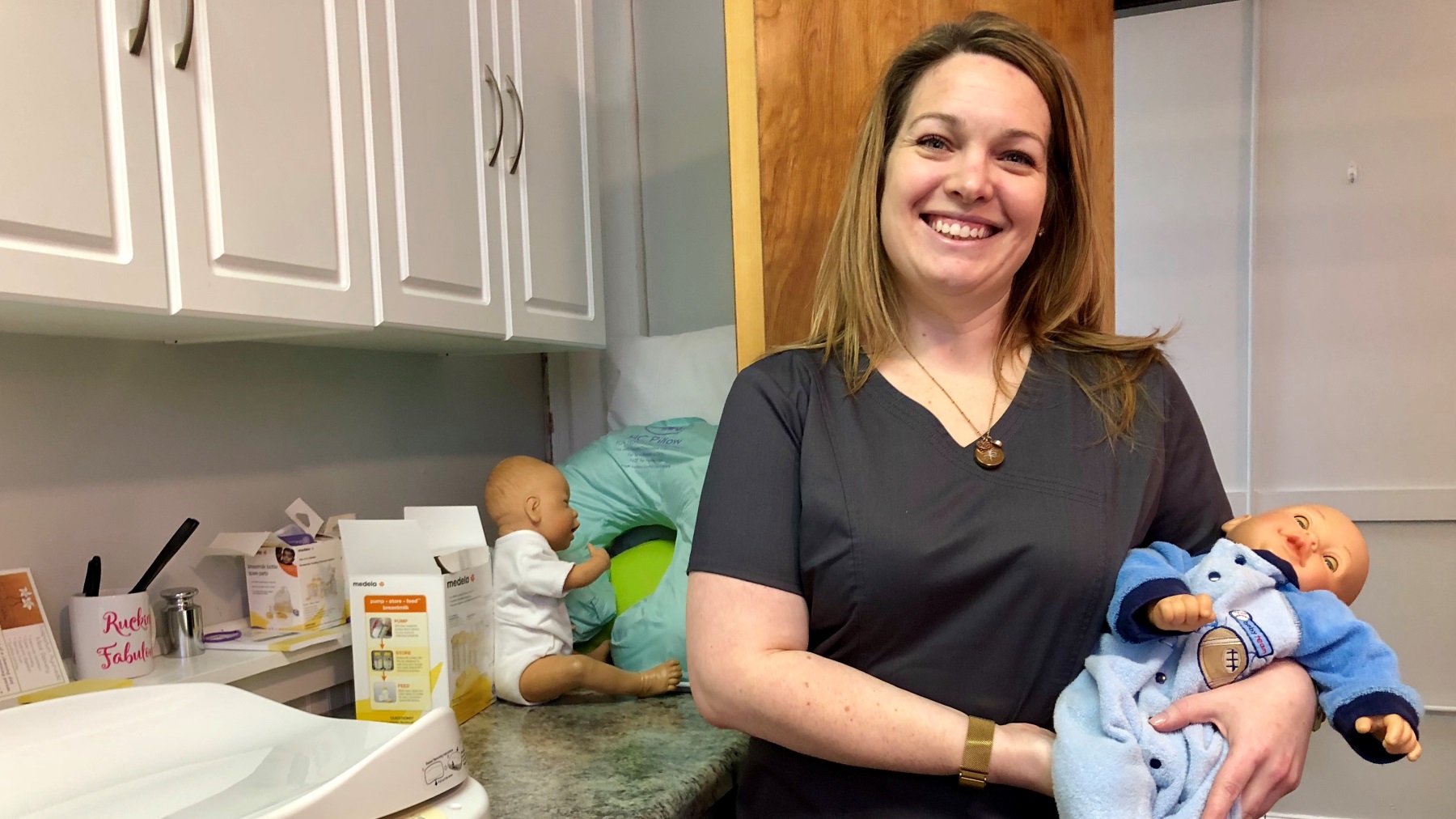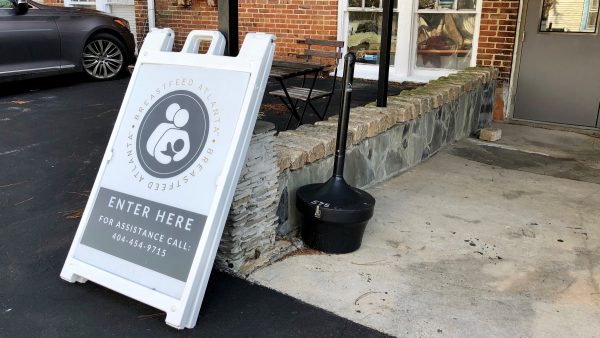Breastfeeding Advocates: 2016 Ga. Licensure Law A First Of Many Steps

Christie Coursey, International Board Certified Lactation Consultant and owner of Breastfeed Atlanta, holds a weighted baby she often uses during breastfeeding consultations.
Jim Burress / WABE
When the “Georgia Lactation Consultant Practice Act” took effect in July 2016, the state became only the second in the nation to license professional breastfeeding specialists.
“It took us a few years to get everyone educated at the Capitol,” said Merrilee Gober, the licensure liaison for the Southeastern Lactation Consultant Association (SELCA).
Four years, in fact.
Gober, herself a registered nurse and attorney, characterized the push as “long and arduous.” But, she said, the time spent was worthwhile. “You don’t want to pass legislation that the state doesn’t really need, but this was definitely a need.”
Licensure Just The First Step

In the 19 months since Gov. Nathan Deal signed HB 649 into law, Gober and a host of other breastfeeding advocates have continued working to expand the understanding of, and access to, the field of specialized breastfeeding.
“Most new mothers can benefit from some time with a lactation consultant,” said Christie Coursey, an International Board Certified Lactation Consultant and owner of Breastfeed Atlanta. “But unfortunately, it’s not available to everyone because cost is a huge factor — for anything in health care — but especially after having a baby.”
Coursey said the average patient’s bill over the course of treatment is about $500, with office visits costing between $50 and $100 each.
Prior to 2016, patients would have had to cover Coursey’s fees completely out of pocket. That’s because insurance companies, in general, only will contract with licensed health providers. When Georgia established licensure, it opened the door for insurance providers to shoulder those charges.
It also led Coursey to open her doors, a move she called “part coincidence and partly because of the law.” Prior to HB 649 taking effect, she went to clients’ homes. She said the licensure law made her feel more confident about signing a lease and establishing a brick-and-mortar office — a modest 500-square-foot space in the basement of a long-defunct Methodist church in Grant Park, originally constructed in 1922.
An average of 30 patients a week visit Breastfeed Atlanta, according to Coursey, either for one-on-one consultations or for one of three group sessions. They run the gamut, from parents nervous about breastfeeding in general to mothers experiencing mastitis — inflammation that causes everything from sore, painful breasts to flu-like symptoms.
For new mother and Breastfeed Atlanta patient Jessica Kline, breastfeeding her son Wallace was so painful it overwhelmed her.
“Not to be too graphic, but my nipples were cracked and bleeding for about eight weeks,” she said.
The experience shattered the first-time mother’s confidence.
“After I had my son, it was like, ‘I can do this! I’m Super Mom!’” But Kline, herself an ICU nurse with a background in pediatrics, quickly realized she didn’t possess superpowers. It was an epiphany she compared to getting hit by a bus.
“I didn’t realize the amount of support that I actually needed.”
According to a 2016 report to the Medical Association of Georgia Alliance, there were 364 International Board Certified Lactation Consultants in the state. That’s about one-third the number the Centers for Disease Control and Prevention recommended.
That relatively small number of providers keeps Breastfeed Atlanta owner Coursey and other IBCLCs busy.
“We’re approaching our limit, but we can help a few more moms,” she said. “As access [to IBCLCs] grows, hopefully, employment will grow, and we’ll have more people wanting to come into the field.”
Access Remains An Issue
Although HB 649 created an avenue for health insurers to pay for professional lactation consultations, it didn’t mandate they cover the costs.
Currently in Georgia, only private insurers Aetna and Kaiser finance the specialized visits. And even though Medicaid funds more than half of the births across the state, just one of Georgia’s four Care Management Organizations — CareSource — has indicated it will cover consultations with an IBCLC provider.
While the Georgia Lactation Consultant Practice Act has been in effect for more than a year-and-a-half, it’s only been in the past several months the Georgia Secretary of State has accepted licensure applications. To date, just 35 IBCLCs had been granted licensure. After July 1, Georgia will forbid lactation care providers without a state license from practicing.
In addition to sounding the alarm over that looming deadline, breastfeeding advocates continue a strategic push to get the state to expand educational training.
And it’s worked.
Georgia Northwestern Technical College in Gordon last month began offering the state’s first lactation consultant certificate program. But with an expected enrollment of just 60 students over the next three years, SELCA’s Gober said there’s much more to do.
“We just need education, education, education,” Gober said. “We’ve got to have physicians hiring these people as part of their practices. We’ve got to have hospitals creating outpatient breastfeeding clinics for new mothers and babies. We’ve got to have jobs for lactation consultants.”
Getting there will take time, Gober admitted. But she said the direct savings to the health care system and improved outcomes for Georgia’s babies and mothers are worth it.








